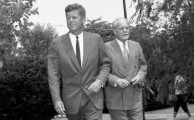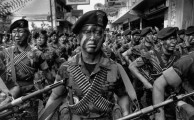
How the worst blot on JFK’s presidency happened
Was Allen Dulles’ early dementia to blame for the Bay of Pigs?

Glimmers of Hope in Guatemala
A few weeks ago in Guatemala, I participated in a long-overdue commemoration. September 14 was the one-hundredth anniversary of the birth of President Jacobo Árbenz, a former army officer who was elected in 1950, then ousted in 1954 in a coup organized by the CIA, and replaced by a military junta. His name has been taboo in Guatemala for most of the time since then. Many in the ruling elite still consider the causes he championed—land reform above all—repugnant and mortally dangerous. September’s commemoration included speeches, conferences, and a vote by the city council in Quetzaltenango, where Árbenz was born in 1913, to name the local airport in his honor.
Stephen Kinzer talks with Christopher Lydon on Radio Open Source
I found those two episodes most interesting. First, the President of the US announced… he was going to bomb Syria, but many in Congress and in the country were against it, and he called it off. I can’t remember any episode like this in my lifetime, where a president of the United States announced he wanted to bomb a country — but the American people were against it? This is something quite remarkable. We’ve always supported military action when presidents decide to launch them. Then came the telephone call between President Obama and the president of Iran. This is another supreme violation of another basic Dulles principle. The Dulles brothers believed you should never have dialogue with your enemy. They were strong against, for example, any summits between American leaders and Soviet leaders. They felt that this would only destroy the paradigm of conflict. It makes the other person seem possibly sane and rational, and then you can no longer portray them as evil and threatening. So these two episodes — the refusal to bomb Syria and the contact with Iran — make me ask this question: did the Dulles Era just end?
